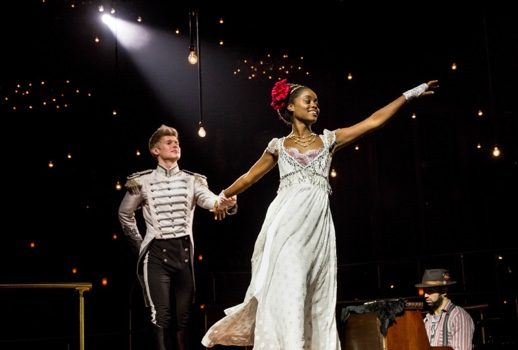

The travails of Natasha, Pierre, Andrey, Anatole, and company are really a funny, tongue-in-cheek soap opera. Natasha, Pierre and the Great Comet of 1812 is one of those improbable shows that throws in everything, including the kitchen sink, cabinet and refrigerator, and somehow the final product just works.
One of the things director Rachel Chavkin did was to make the sprawling Tolstoy novel an intimate ensemble musical. The Imperial Theater’s stage has been transformed into a cabaret nightclub, with many audience members seated onstage.
The performers circulate the theater all night singing, dancing, playing musical instruments, and throwing out little boxes of pierogi. Sometimes the action will take right place at the seats of some audience members. There really isn’t a bad seat in the house because of the constant performer-audience interaction.
David Malloy‘s score ingeniously combines pop ballads with Russian folk dance with electronica with burlesque entertainment with good old-fashioned musical theater numbers. The musical is almost entirely sung. The lyrics are cheeky and witty—as I said, whoever thought Tolstoy could be funny? The opening number warns:
Gonna have to study up a little bit
If you wanna keep with the plot,
Cuz it’s a complicated Russian novel,
Everyone’s got nine different names. . . .
Balaga is fun, Bolkonsky is crazy, Mary is plain, Dolokhov is fierce, Hélène is a slut, Anatole is hot, Marya is old-school, Sonya is good, Natasha is young and Andrey isn’t here.
And what about Pierre?
Dear, bewildered and awkward Pierre? What about Pierre?
The show is an ensemble—it’s not The Color Purple or Gypsy where if you don’t have a good Celie or Madame Rose, there’s no show. The energy of the cast is infectious. In fact, one reason this musical so enjoyable is that everyone is likable.
Josh Groban as the alcoholic, depressed Pierre is a marvel—he doesn’t treat this as a star turn. He immerses himself fully in the character. He spends most of the musical in the orchestra pit, playing the piano, drinking wine, and narrating the story. He even wears a fat suit to give himself a paunch. His powerful, mellifluous voice is only used to for “Dust and Ashes” and the final number.
Denée Benton is also a wonder as Natasha. Her pretty, bell-like soprano voice and charming stage manner wins the audience over immediately. Hard to believe this is her Broadway debut, as she is so poised and graceful throughout the evening.
Lucas Steele’s Anatole is dressed like an 1980’s style punk rock star and he succeeds in making the character charismatic enough so you believe the lady-killer charms. There isn’t a weak link in the cast. Brittain Ashford makes her character (the “good” Sonya) immensely likable and she even has her own show-stopping number (“Sonya Alone”). Even dour Mary (Gelsey Bell) becomes endearing. “Slut” Hélène (Amber Gray) is played as a burlesque character, but at the end of the day, you like her too.
The ensemble players anchor the cast because of their constant circulation through the theater —the violin and accordion players and gypsy dancers are just as important as Groban and Denton because they’re usually performing inches away from us.. The 11’o-clock number is “Balaga,” a singing, dancing, fiddler and accordion extravaganza which spans the entire theater, all the way to the top of the balcony.
Sam Pinkleton’s choreography is so diverse—one minute you’re at a Russian wedding, the next minute you’re at a rave. The show never becomes pretentious, never loses its momentum.
But I can’t really descibe the musical very well. You really just have to see it for yourself. But this is how much I enjoyed the show: when I got home the first thing I did was download War and Peace onto my kindle.
Photo: Chad Batka.
























Comments